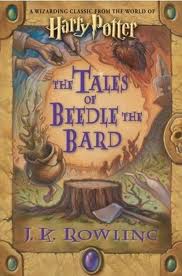The Tales of Beedle the Bard by J.K. Rowling
Reviewed by Ellen

Ratings Explanation
Violence: Witchhunters of the Middle Ages seek to persecute, imprison, or behead witches and wizards in one tale. In another, a wicked warlock kills a maiden he woos to steal her beating heart and replace his own with hers, then dies in the process. In another tale of three wizard brothers, one brother dies when his throat is slit; another kills himself.
Adult Themes: Typical unethical behavior of witches and wizards seeking to gain control over others.
Synopsis
This book is a short collection of five fairytales from the magical world of Harry Potter. The tales were supposedly written by a 15th century wizard named Beedle the Bard (a sort of magical version of Hans Christian Andersen), and include extensive commentary by the late Hogwarts Headmaster Albus Dumbledore. The commentary is often longer than the tales themselves, but very tongue-in-cheek and well-written. So now the “Muggle” reader can enjoy such familiar tales to the wizarding world as “The Warlock’s Hairy Heart” and “Babbitty Rabbitty and Her Cackling Stump.” Like traditional fairytales, virtue is prized and wickedness is condemned; those who deserve to come to a bad end generally do. However, unlike Muggle children’s fairytales in which magic often lies at the root of a person’s troubles (a spell has been cast on our heroine by a wicked witch, for example), these tales are meant to teach young wizards and witches that magic can cause as much trouble as it cures.
This is an enjoyable read for any fan of Harry Potter. My favorite tale of the five was “The Fountain of Fair Fortune,” in which three young, clever witches seek to relieve themselves of their sufferings and trials by entering the magical curing waters of the fountain, but in the end solve their problems through their own wit and wisdom.







